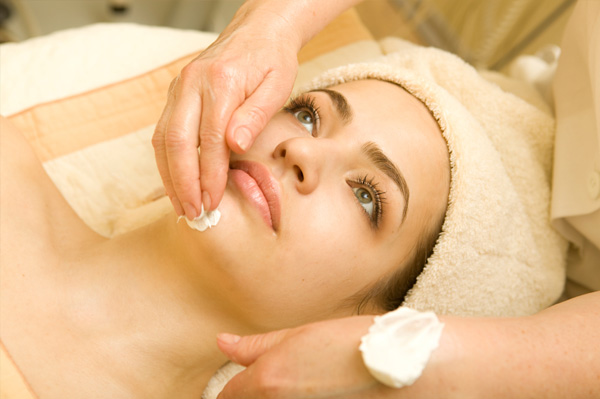
"Every skin is different, so facials should be customized based on what's going on with your skin at the time of your appointment," explains Serviss. She takes us through every skin type and provides the best facial treatments for each.
Dry skin
Dry skin needs many different treatments, Serviss explains. Dry skin lacks natural lipids or oils, making it prone to dehydration. Because of this lack of water, the skin's natural exfoliating cycle slows down. Facials that include gentle exfoliation (i.e. with enzymes) are a great way to take your skin from flakey to fabulous. Dry skin also needs both oil and water to balance it out, so Serviss suggests looking for facials that include masks, which will help penetrate product into the skin. One example is a mask that will rubberize. It may sound a little strange, but any product you put under this type of mask will be pushed into the skin as the mask hardens, leaving your skin feeling hydrated and refreshed.
Oily skin
Oily skin produces more oil than it needs. This oil is a magnet for debris, such as skin cells, makeup and pollution, which then cause congestion inside the pores. Over time, the congestion becomes hardened, just like plaque on your teeth. Look for facials that include a chemical exfoliant (glycolic acid or salicylic acid.) This will penetrate into the pores and melt the congestion. Oily skin also needs extractions to remove any hardened debris within the pores (so long, blackheads!) But don't try this at home. Extractions are something your esthetician is trained to do safely as part of your facial.
Combination skin
Serviss's favorite skin type to work with, combination skin, has both oily and dry areas, so these areas need to be treated separately. Enzyme, chemical or even microdermabrasion exfoliants work very well, Serviss says. Extractions are also needed (usually in the T-zone) to remove congestion, and a professional treatment mask, such as freeze-dried collagen to replenish lost water and soothe the skin.
Mature skin
Mature skin can be challenging. It can be oily/acne prone, dry/dehydrated or a multitude of skin type combinations. Mature skin also slows down (cell production, circulation), so there are many issues to address. Your esthetician will first treat the type of skin (oily, dry, combination, normal).Then she will have to focus on that slowing process to increase circulation and saturate the skin with antioxidants, vitamins and minerals for healthier, younger looking skin.
Sensitive skin
"We have to be careful working with sensitive skin," Serviss notes. All skin needs exfoliation to remove built-up dead skin, but this needs to be done gently. Facials that use enzymes to exfoliate work very well, because they don't irritate the skin. Also look for products that don't have excessive fragrances or irritants in them.
Once you're back at home
Serviss has some simple at-home tips for keeping skin looking great:
• Cleanse to remove debris from the day
• Use a toner to rehydrate the skin after cleansing (rehydrating will make your moisturizers penetrate better)
• Exfoliate to help with the natural cycle of shedding dead skin
• Moisturize to replenish
• Protect to inhibit free radicals and shield the skin from UV damage
"Everyone should be doing these steps," Serviss says. The steps stay the same for every skin type, but the products you use to complete the steps will be different for everyone. If you are unsure, talk to your esthetician about what products are best for your skin type.
No comments:
Post a Comment